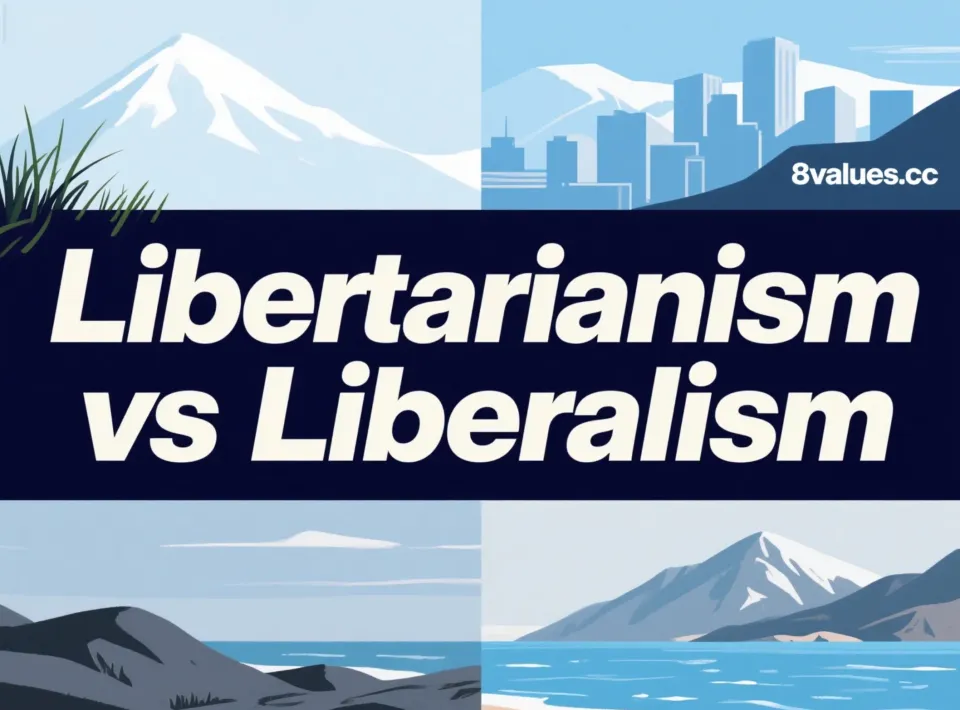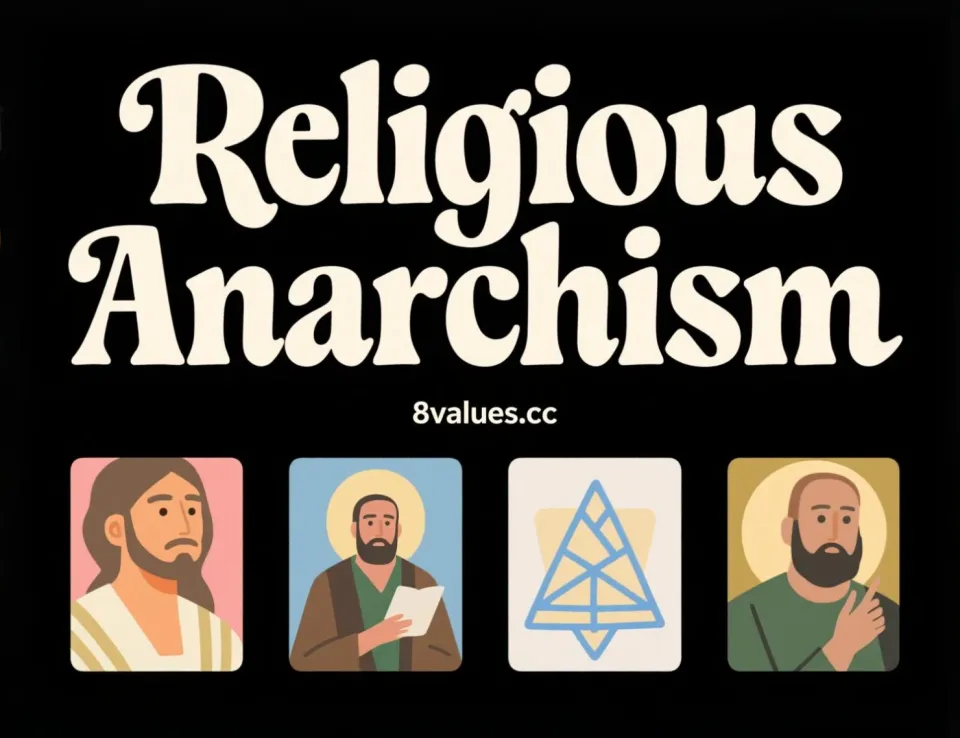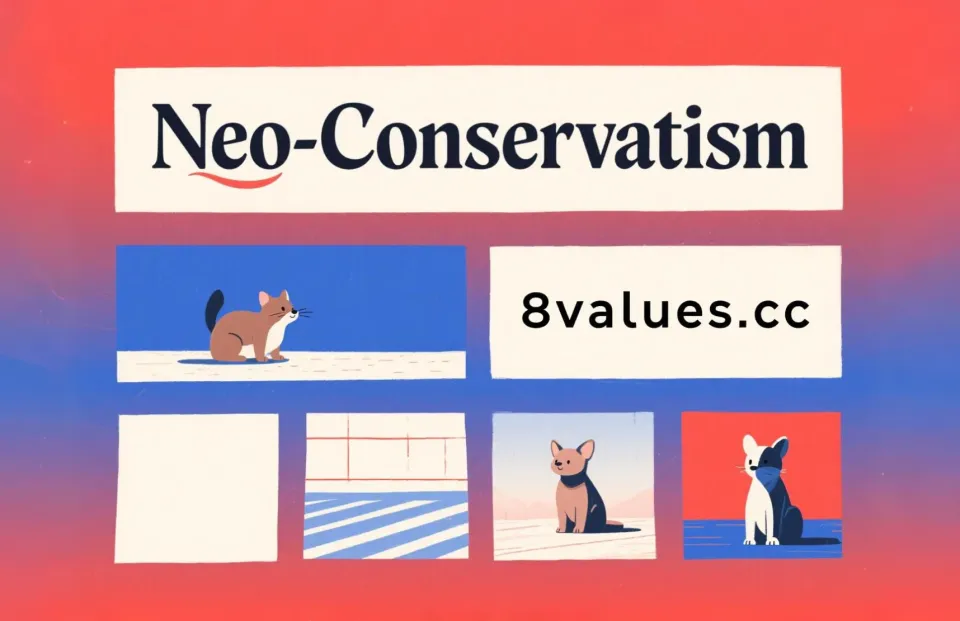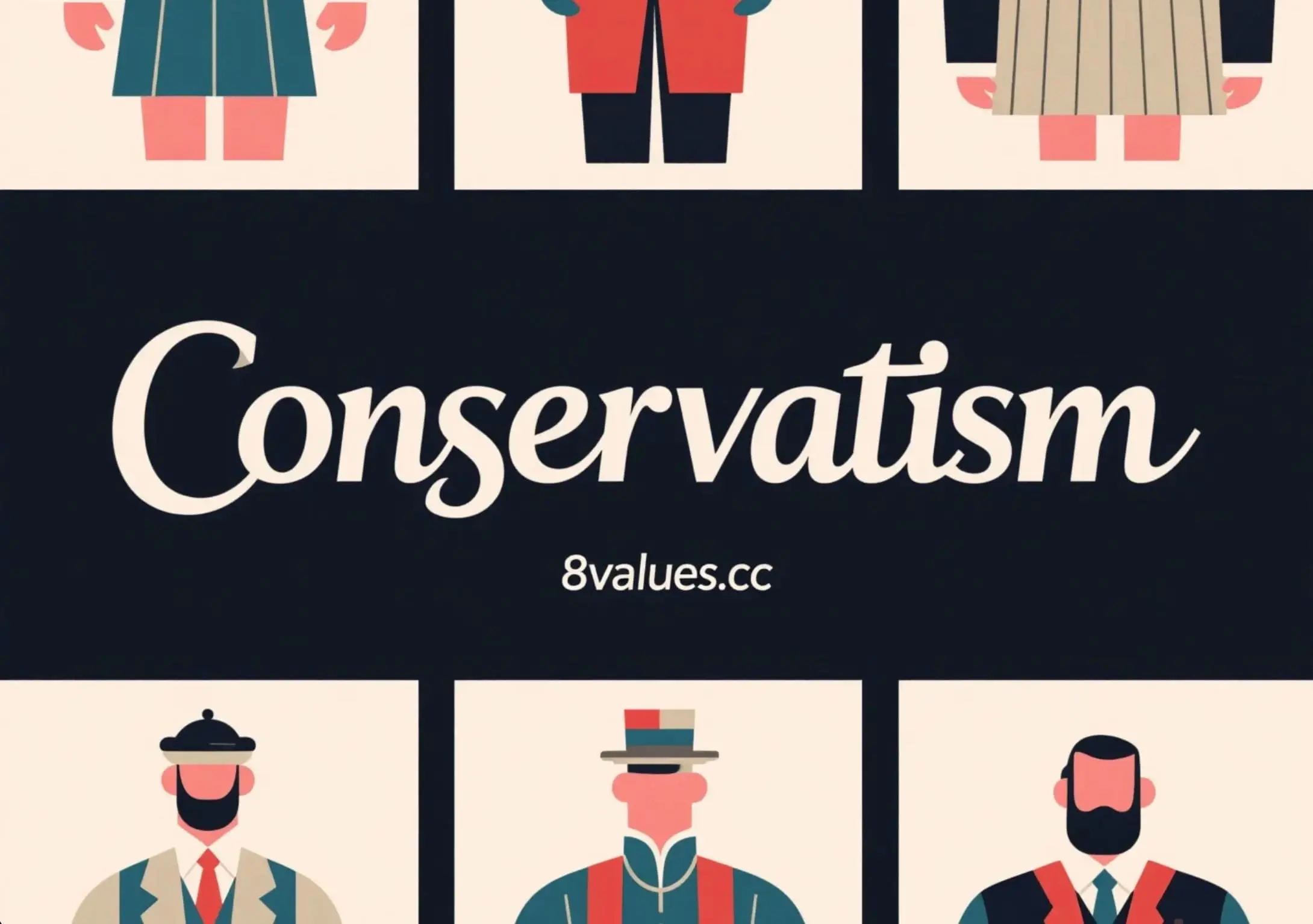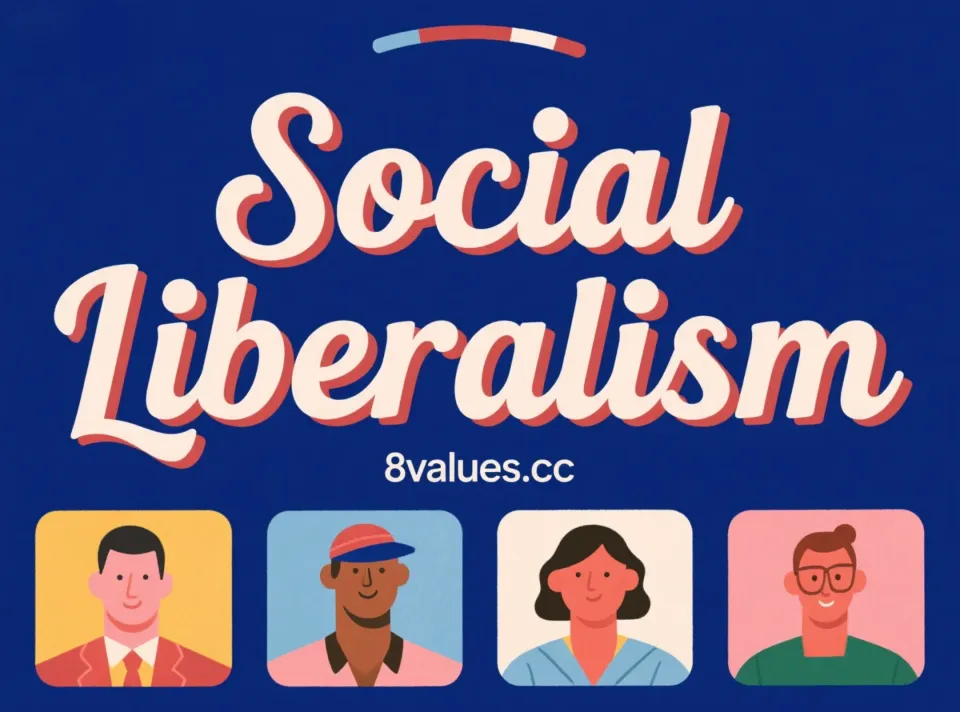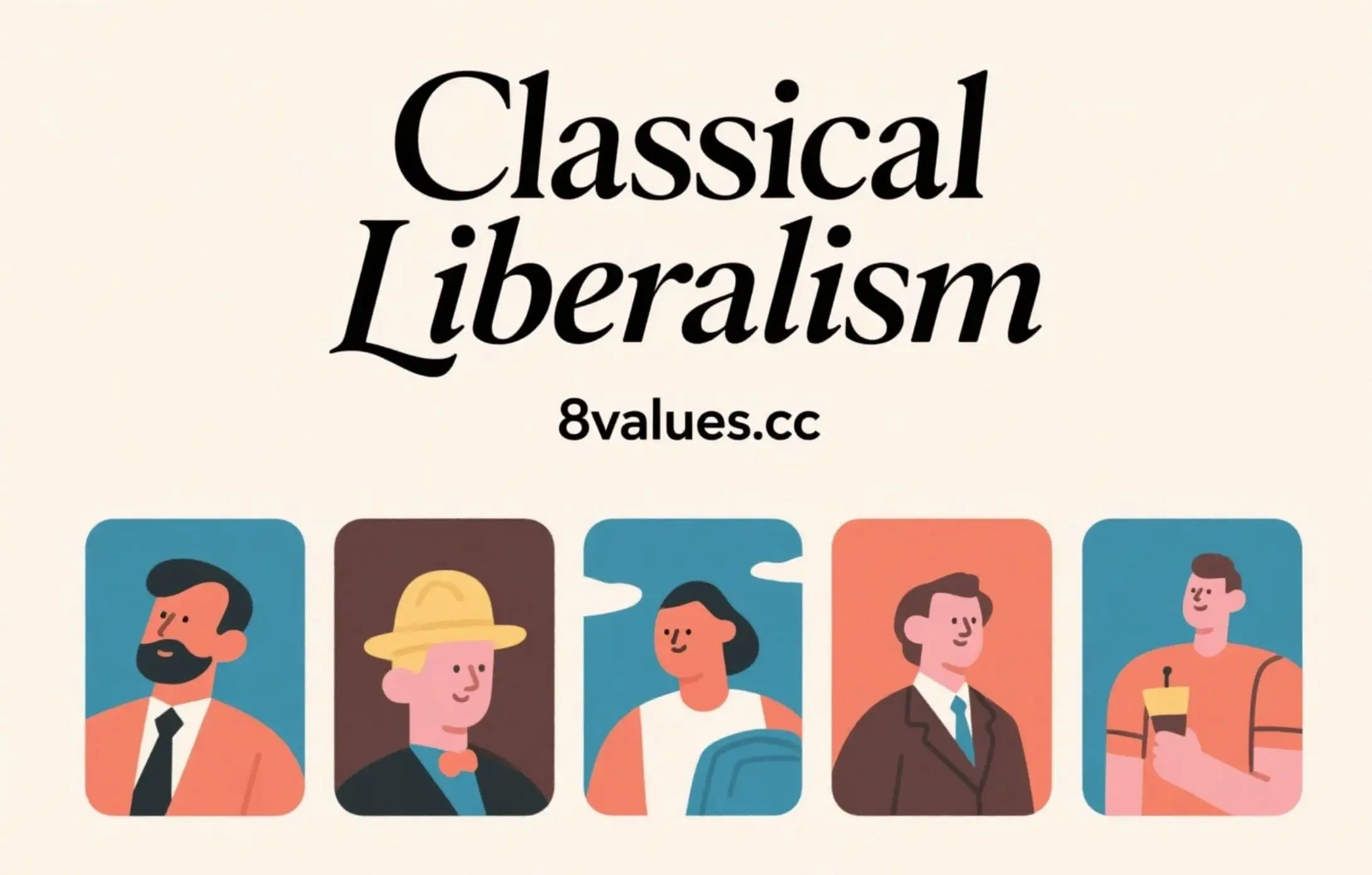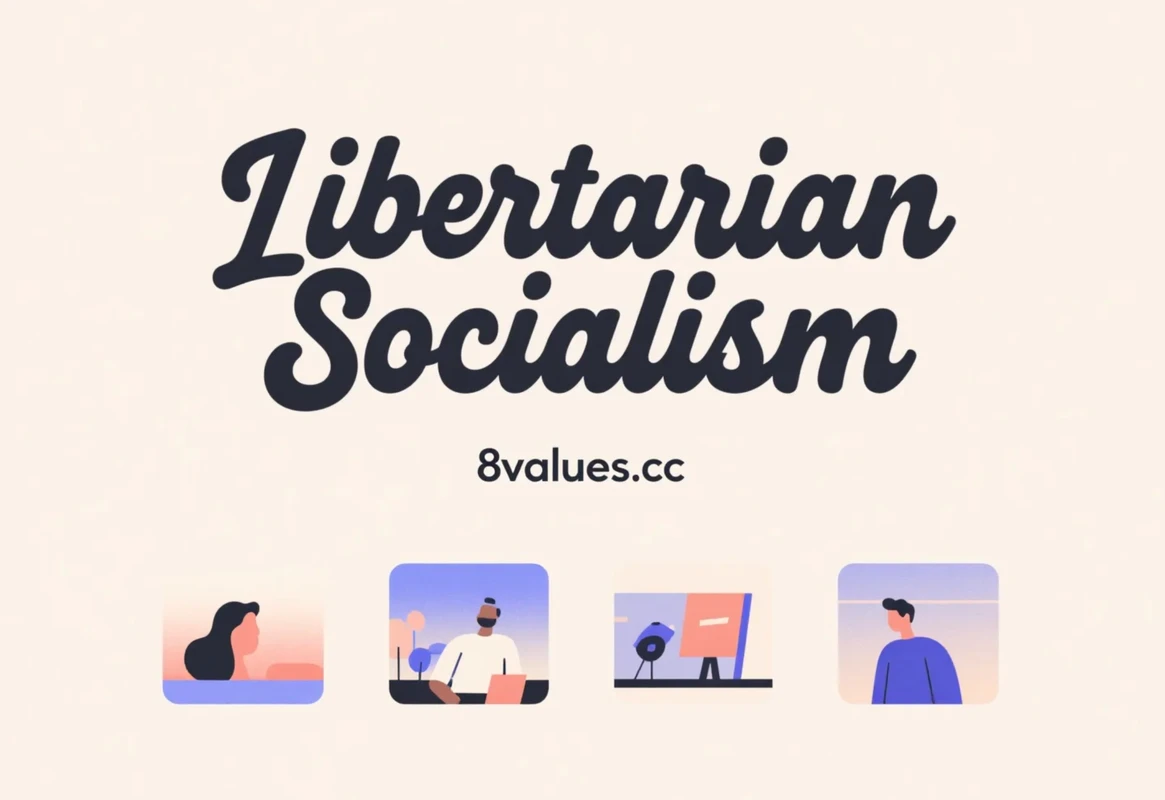Libertarianism and Liberalism: The core differences between the two major political ideologies
Deeply explore two political ideologies with far-reaching influences: Libertarianism and Liberalism. Understand their origins, core principles, policy propositions and the shaping of contemporary politics and discover your political stance through 8 values political leaning tests.
Political ideology is the key to understanding social operations and policy debates. Among many schools of thought, Libertarianism and Liberalism are two influential political philosophies, each with unique historical background and evolutionary trajectory. These two ideologies have had a significant impact on contemporary politics and continue to shape policy discussions around the world. To deeply participate in political philosophy discussions, it is crucial to understand the core differences between them.
The Origins of Libertarianism and Liberalism
The budding of Libertarianism
The roots of libertarianism can be traced back to the classical concept of freedom that emerged from the Enlightenment era in the 17th to 18th centuries. Influenced by thinkers such as John Locke and Adam Smith, classical liberals advocated individual rights , limited government intervention and economic freedom .
Entering the 20th century, Libertarianism evolved into an independent ideology that emphasized individual freedom and advocated a substantial reduction in government intervention in the economic and social fields. Influential figures such as Friedrich Hayek and Milton Friedman promoted the popularity of liberalism through their works. In the United States, Libertarianism is often associated with the Libertarian Party, the largest third party in the United States.
The evolution of Liberalism
Liberalism emerged against the background of social and economic challenges brought about by the Industrial Revolution. In the 19th century, liberals tried to solve inequality and promote social justice . Philosophers such as John Stewart Mill and Thomas Paine played a key role in shaping liberal ideas.
Throughout history, Liberalism has undergone many transformations and adjustments, incorporates progressive values and advocates for government action to address various social problems. In the United States, Liberalism is usually associated with the Democratic Party and small parties such as the Green Party, Peace and Liberal Party.
Both ideologies are evolving and continue to influence political discourse, which provide very different perspectives in terms of individual freedom , government roles , and social progress.
The core ideological difference between Libertarianism and Liberalism
There are important differences between libertarians and liberals in political ideology and policy priorities. But it should be noted that not all libertarians or liberals hold the exact same political beliefs. This guide focuses on the discussion of liberalism and liberalism as political ideology. If you want to dig deeper into the comparisons between different parties, such as the differences between the Liberal Party and the Democratic Party or the Green Party, you can explore the more detailed analysis in all results ideologies .
1. Core principles and beliefs
- Libertarianism
- Personal freedom : Put personal freedom and personal autonomy in supreme position. Individuals have the right to make choices without excessive government intervention.
- Government role : Advocate the minimization of government role, and the power and intervention in citizens' lives and economy should be limited.
- Economic freedom : Believe in free market capitalism , emphasizing the role of voluntary exchanges and private property rights in promoting economic prosperity.
- Liberalism
- Personal freedom : value personal freedom, but recognizes the need for government regulation to protect these freedoms and ensure fairness.
- Government role : It is believed that governments should play a more active role in solving social and economic problems, promote equality through policies and programs and protect vulnerable groups.
- Social Justice : Social justice is the core creed of liberalism, advocating for solving inequality and creating a more just and equitable social policy.
On social issues, libertarians emphasize individual autonomy and minimal government intervention , while liberals seek to address social inequality and protect civil liberties through government actions .
2. Economic Policy
- Libertarianism
- Free market capitalism : Advocate a laissez-faire economic system with minimal government intervention.
- Government regulation : Support reduction of government regulation to encourage market efficiency and individual autonomy.
- Low Taxes : Advocate lower taxes, believing that individuals should retain a larger portion of their income.
- Minimum Social Welfare : Opposes a wide range of social welfare programs and prefers voluntary and private charitable solutions.
- Liberalism
- Mixed Economy : Advocate the combination of free markets and government intervention to resolve economic gaps.
- Government regulation : Support government regulation to prevent market abuse and protect consumers and workers.
- Progressive tax system : Advocate higher taxes on the rich to fund social programs and reduce income inequality.
- Social Welfare Program : Advocate a strong social safety net to support vulnerable groups and meet basic needs.
3. Social Policy
- Libertarianism
- Personal autonomy : Emphasizes individual freedom and self-decision in personal choices and lifestyles.
- Minimum government intervention : Advocate that government intervention on social issues is limited and allows individuals to make their own decisions.
- Civil Liberties : Strong support for the protection of civil liberties such as freedom of speech and privacy.
- Liberalism
- Individual autonomy : attach importance to personal freedom, but recognizes that certain regulations are needed to protect society.
- Government intervention : Support government action to address social inequality and ensure equal opportunities for all.
- Civil Liberties : Prioritize civil liberties, emphasizing the importance of equal rights and protection for all citizens.
Understanding the differences in social policies is essential to understand how these ideologies treat personal freedom and social issues. Their comparison of government intervention in individual choice and civil liberties highlights ideological divisions and their impact on social and individual rights.
4. Healthcare
- Libertarianism
- Market-driven : It is believed that health care should be driven primarily by free markets with minimal government intervention.
- Personal Responsibility : Emphasizes individual responsibilities for health care options and costs, and advocates reduced reliance on government funded programs.
- Private sector solutions : It believes that private sector competition and innovation will lead to better and more efficient healthcare services.
- Liberalism
- Universal access : consider health care as a fundamental right, advocating the establishment of a system that ensures universal access to health care services.
- Government role : Support governments to play a more important role in healthcare, whether it is government operations or a strictly regulated system.
- Social Security Network : It believes that the government should provide a safety net to ensure that all citizens have access to health care.
5. Education
- Libertarianism
- Government intervention : Supports reduced government intervention in education and advocates for more parental choices and school competition.
- Free Market Education : It is believed that education should be driven by market forces, and private schools and family education provides viable alternatives.
- Liberalism
- Equal admission and quality : treat education as a public product, advocate for government investment and regulation to ensure equitable admission and high-quality education.
- Public Education Support : Support a strong public education system and increase government funding for education.
6. Environmental and climate change
- Libertarianism
- Government intervention : Environmental protection is believed to be best achieved through free market solutions without strict government regulations.
- Private property rights : Advocate the protection of private property rights, believing that individuals will be motivated to protect their property and the environment.
- Voluntary Solutions : Preference to voluntary initiatives and private conservation efforts over mandatory government programs.
- Liberalism
- Government Action : View environmental protection as a key role of the government, advocate strong regulations to address climate change and protect natural resources.
- Collective Responsibility : Believe that the whole society must take action to solve environmental problems and protect the earth for future generations.
- Clean Energy Investment : Support government investment in renewable energy and green technologies to transform to a more sustainable future.
Overall, libertarians tend to minimize government intervention and rely on voluntary and market-oriented solutions to protect the environment. Liberals emphasize government actions and regulation to combat climate change and protect the environment.
Impact on contemporary politics
Both Libertarianism and Liberalism have made important contributions to modern politics. Here are the most influential ideas in each ideology:
Libertarianism Thought
- Government Size : Liberalism influences debate on the scale and scope of government, advocating for small government and reducing government intervention .
- Economic Policy : The economic principles of liberalism, such as free market capitalism and fiscal conservatism , have influenced discussions on taxation, regulation and economic growth.
- Civil Liberties : Liberalism’s emphasis on civil rights shapes debates about privacy, freedom of speech, and individual autonomy.
- Foreign Policy : The liberal non-interventionist perspective has influenced discussions on military intervention and overseas participation.
Liberalism Thought
- Social Welfare : Liberal thought drives debate on social welfare policies , universal health care and poverty alleviation programs .
- Government regulation : Liberal principles influence discussions about government intervention to address social inequality and protect consumers and workers.
- Social Justice : Liberal thoughts on social justice influence discussions on civil rights, racial equality, and LGBTQ+ rights.
- Environmental Protection : Liberal emphasis on environmental protection has affected climate change policies and the debate on sustainable development.
The influence of Libertarianism and Liberalism ideas on contemporary politics is reflected in policy debate, party program and policy-making decisions. These ideologies shape political discourse and promote discussions about government roles, economic policies, social and environmental protection. Understanding their influence is crucial to understanding the ideological basis of political debate and the formation of public policy in today's political landscape.
Criticism and Challenge
Libertarianism and Liberalism have faced various criticisms and challenges over the years.
Criticism of Libertarianism
- Limited Government : Critics argue that a minimizing government may lead to insufficient social safety nets and leave vulnerable groups unsupported.
- Market Solutions : When applying market-oriented solutions to complex issues such as healthcare and environmental protection, they may not fully meet social needs, which poses challenges.
- Income inequality : Critics claim that unregulated markets may exacerbate income inequality and keep wealth concentrated in the hands of a few.
- Foreign Policy Concerns : Critics question whether non-interventionist foreign policy can effectively respond to global challenges and protect national interests.
Criticism of Liberalism
- Over-intervention by government : Critics believe that over-active government can lead to over-regulation and hinder economic growth and personal freedom.
- High Taxes and Expenditures : Funding a wide range of social welfare programs presents challenges, and critics expressed concern about the burden on the economy of high taxes .
- Economic Efficiency : Critics question whether government intervention in the economy will kill innovation and hinder market efficiency .
- Social Conservatism : Some critics argue that liberal social policies undermine traditional values and moral frameworks .
Resolving common critiques and challenges is crucial to understanding the limitations and complexities of applying Libertarianism and Liberalism ideologies to real-world situations. Recognizing these critiques helps balanced discussions and informed decisions in policy development and governance to best serve social needs.
Potential areas of cooperation
Although the approach is different, libertarians and liberals can find common ground and collaborate in some areas. Here are some potential areas of cooperation:
- Civil and personal freedom : both libertarians and liberals prioritize civil and personal freedom , creating opportunities for cooperation to protect individual rights and privacy.
- Criminal Justice Reform : Both focus on criminal justice issues , which may lead to cooperation in advocating fair and just reforms.
- Drug Policy : Both ideologies may find common ground in supporting drug policy reforms (such as decriminalization or legalization), focusing on individual freedom and public health.
- Anti-business impact : libertarians and liberals can collaborate to address the impact of businesses on politics and seek campaign financial reform.
- Environmental protection : Despite different approaches, both ideologies care about environmental sustainability , thereby promoting opportunities for cooperation in conservation efforts.
- Privacy and surveillance : Libertarians and liberals can unite to advocate stricter measures to protect citizens’ privacy in the digital age .
- Non-interventionist foreign policy : Both ideologies may find common ground in promoting diplomacy and reducing overseas military intervention.
Conclusion
As the political landscape evolves, two political ideologies, Libertarianism and Liberalism, will continue to shape policy debates and influence modern governance in dealing with emerging problems and adjusting their platforms to meet the needs of the times. Their importance in shaping future policies and governance remains an important aspect of contemporary political analysis.
Want to conduct a more in-depth political analysis? Explore 8values All results ideologies and learn more about the resources related to political ideologies and parties. In addition, you can find more articles on political theory and its real-life applications in our blog .
